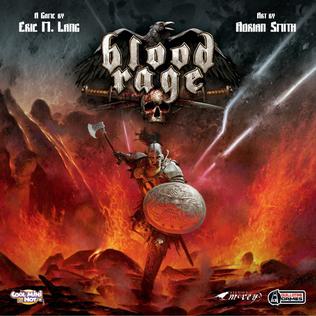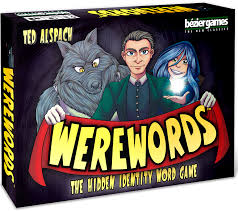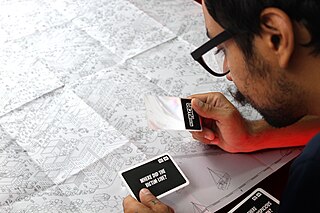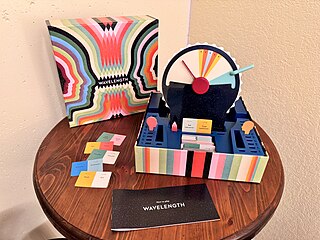
Taboo is a word, guessing, and party game published by Parker Brothers in 1989. The objective of the game is for a player to have their partners guess the word on the player's card without using the word itself or five additional words listed on the card.
Modern Art is an auction game designed by Reiner Knizia and first published in 1992 by Hans im Glück in German. Players represent art dealers, both buying and selling works of art by five different fictional artists. At the end of each round, they sell the paintings they bought back to the "bank". More popular artists' works are worth more, and the value carries over into future rounds. Although the game is played entirely using cards, a board is used for scoring, so the game is sometimes referred to as a board game. 25 versions has been released for the game. It was also recommended for the 1993 Spiel des Jahres.

Agricola is a Euro-style board game created by Uwe Rosenberg. It is a worker placement game with a focus on resource management. In Agricola, players are farmers who sow, plow the fields, collect wood, build stables, buy animals, expand their farms and feed their families. After 14 rounds players calculate their score based on the size and prosperity of the household.

Enchanted Forest is a board game designed by Alex Randolph and Michel Matschoss that requires players to remember the locations of fairytale treasures. The first edition of the game was published by Ravensburger in Germany in 1981 under the original name Sagaland.

FITS (Fill In The Spaces) is a Tetris-like board game published by Ravensburger in 2009.

Dixit, is a French board game created by Jean-Louis Roubira, illustrated by Marie Cardouat, and published by Libellud. Using a set of cards illustrated with dreamlike images, players select cards that match a title suggested by the designated storyteller player, and attempt to guess which card the storyteller selected. The game was introduced in 2008. Dixit won the 2010 Spiel des Jahres award.
Time's Up is a charades-based party game designed by Peter Sarrett, and published by R&R Games, Inc., a Tampa, Florida–based manufacturer of tabletop games and party games. The first edition of the game was published in 1999, with the most recent edition, Time's Up! Deluxe, published in 2008. It is a game for teams of two or more players, and is played in three rounds. Time's Up! is based on the classic parlour game known as Celebrity.

Las Vegas is a board game designed by Rüdiger Dorn and published by Ravensburger in 2012. It is named after the city of Las Vegas in Nevada, United States and has a gambling theme. The game was also nominated for the Spiel des Jahres prize in 2012.

Hanabi is a cooperative card game created by French game designer Antoine Bauza and published in 2010. Players are aware of other players' cards but not their own, and attempt to play a series of cards in a specific order to set off a simulated fireworks show. The types of information that players may give to each other is limited, as is the total amount of information that can be given during the game. In 2013, Hanabi won the Spiel des Jahres, an industry award for best board game of the year.

Forbidden Island is a cooperative board game developed by Matt Leacock and published by Gamewright Games in 2010. Two to four players take the roles of different adventurers, moving around a mysterious island and looking for hidden treasures as the island sinks around them. All players win if they find all the hidden treasures and they all make it back to the helicopter and fly away, and they all lose if they cannot.

Concept is a deduction party board game released in 2013. The game was designed by Alain Rivollet and Gaëtan Beaujannot and published by Repos Production. It has collected multiple awards and nominations including the Jeu de l'Année prize in Cannes in 2014.

Codenames is a 2015 party card game designed by Vlaada Chvátil and published by Czech Games Edition. Two teams compete by each having a "spymaster" give one-word clues that can point to multiple words on the board. The other players on the team attempt to guess their team's words while avoiding the words of the other team. Codenames received positive reviews and won the 2016 Spiel des Jahres award for the best board game of the year.

Colt Express is a railway-themed family board game designed by Christophe Raimbault, Illustrated by Ian Parovel and Jordi Valbuena, published in 2014 by Ludonaute and distributed by Asmodee.

Blood Rage is a Viking themed board game designed by Eric Lang and published by CMON Limited in 2015. Each player controls a clan of mythological Vikings seeking glory as Ragnarok approaches. Played in three ages or rounds, Blood Rage features card drafting, battles and territory control via forces represented by sculpted plastic miniatures. All conflicts are resolved through playing cards, and cards are also used to improve and differentiate the different clans and the leaders, warriors, ships and monsters at their command.

Love Letter is a card game introduced in May 2012 and designed by Seiji Kanai. Its first English-language edition was produced in the United States by Alderac Entertainment Group (AEG) until 2018, when Love Letter was acquired by Z-Man Games.

Werewords is a board game for 4 to 10 players designed by Ted Alspach and published by Bézier Games in 2017. Players guess a secret word by asking questions. There are different roles randomly assigned at the start of play. Villagers try to find out the magic word before the time is up while the werewolves are trying to mislead them.
Spyfall is a 2014 card game for 3–8 players designed by Alexander Ushan and published by Hobby World. A sequel, Spyfall 2, was published in 2017. A superhero themed variant, DC Spyfall, was published in 2018. The game has evolved over the years, with new variations and "advanced rules" emerging to keep gameplay fresh and engaging, a captivating social deduction board game, has become a beloved pastime for many. The game's core premise revolves around uncovering the spy hidden among the players. As the game has evolved, new variations and "advanced rules" have emerged, introducing elements like multiple spies to heighten the challenge and create a more chaotic, engaging experience.

MicroMacro: Crime City is a cooperative tabletop crime-solving hidden object game designed by Johannes Sich and published in 2020 by Edition Spielwiese. The game received positive reviews and won the Spiel des Jahres in 2021. A sequel to the game, MicroMacro: Crime City – Full House was released in August 2021.

Wavelength is a party game designed by Alex Hague, Justin Vickers, and Wolfgang Warsch and published in 2019 by CMYK following a successful Kickstarter campaign. Two teams compete to earn points over multiple rounds by guessing the locations of a hidden target on a custom device based on clues relating to a chosen scale given by a player called the "Psychic".

















